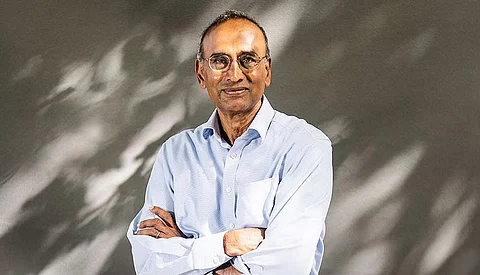

“Ironically, the first [Royal Society] Fellows to come into contact with India were colonisers like Robert Clive and Warren Hastings, or colonial administrators like Thomas Macaulay and Richard Temple. They certainly did not regard Indians as their equals in any way, and would frankly have been astonished that one day, someone born in India would go on to become a fellow, let alone a President of the Society,” reflected Nobel laureate Professor Venki Ramakrishnan, in his farewell address to the Royal Society.
“When I became your President five years ago, the Cameron government had recognised the importance of investment in science. I wanted to see science play a more central role in the national conversation and I wanted to address the narrow nature of our education system. What I did not foresee was that nearly my entire presidency would largely be hijacked by two events: the Brexit referendum and the Covid pandemic,” he noted.
Venkatraman Ramakrishnan, known as Prof. Venki, completed his term as the President of the UK’s Royal Society this month with a virtual Anniversary Day address. The 68-year-old biologist welcomed the “importance of science” being acknowledged the world over, which will ultimately provide the tools out of the coronavirus pandemic crisis.
Prof. Venki noted that there have been “missteps and mistakes” and despite a pandemic being the number one item on the national risk register, we seemed to have been “poorly prepared”.
He said: “We did not take the virus seriously enough, early enough… We must learn from the mistakes made in this pandemic as well as think about how best to plan for future crises including future pandemics, and develop resilience against these shocks to the system. Ultimately it will be science and technology that will provide us the tools, and we must regard investment in it as crucial.”
The academic, who was born in Chidambaram in the southern Indian state of Tamil Nadu, studied biology in the US and has been based in the UK in recent years as a Fellow of Trinity College, Cambridge University. He was elected a Fellow of the Royal Society in 2003 and appointed its President in 2015.
The Royal Society dates back to 1660 and its President is a key advocate for science in the UK and the world. Previous presidents of the Royal Society have included Isaac Newton, Christopher Wren, Samuel Pepys, Joseph Banks, Humphry Davy, and Ernest Rutherford.
With Prof. Venki's term now at a close, he will be succeeded by statistician Sir Adrian Smith, who is the Director and Chief Executive of the Alan Turing Institute for data science and artificial intelligence.
The leading scientist, who also chaired a committee of high-level experts as part of a scientific initiative to analyse emerging data around the coronavirus pandemic from countries around the world, said that science has been thrust into the spotlight as the world struggles to understand the virus and its impact, and battle to manage the suffering it is inflicting on lives.
“The speed at which SARS-CoV2 was identified as the cause of Covid-19 and isolated was amazing. Its genome was rapidly sequenced, paving the way for tests as well as helping to drive progress on treatments. It has enabled the rapid development of vaccines, several of which seem very promising. The pandemic has had a terrible impact on societies but without the tireless efforts of scientists it would have been so much worse,” he said.
With his five-year tenure at the Royal Society largely dominated by two major events – Covid-19 and Brexit – Prof. Venki also repeatedly spoke up to warn against a no-deal Brexit hurting UK science and welcomed the establishment of the Global Talent Visa under the new points-based immigration system as a “significant step”.
“It is a good step towards creating a visa system that can help attract global scientific talent by being welcoming, faster and more flexible, and take into account the long-term aspirations of scientists and their families. But other areas are still unresolved,” he said.